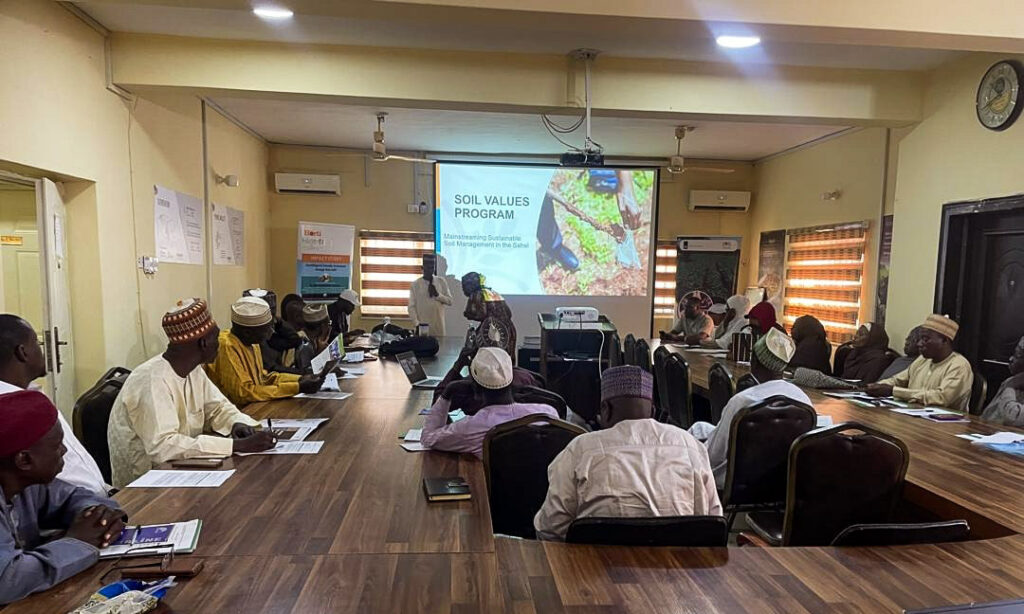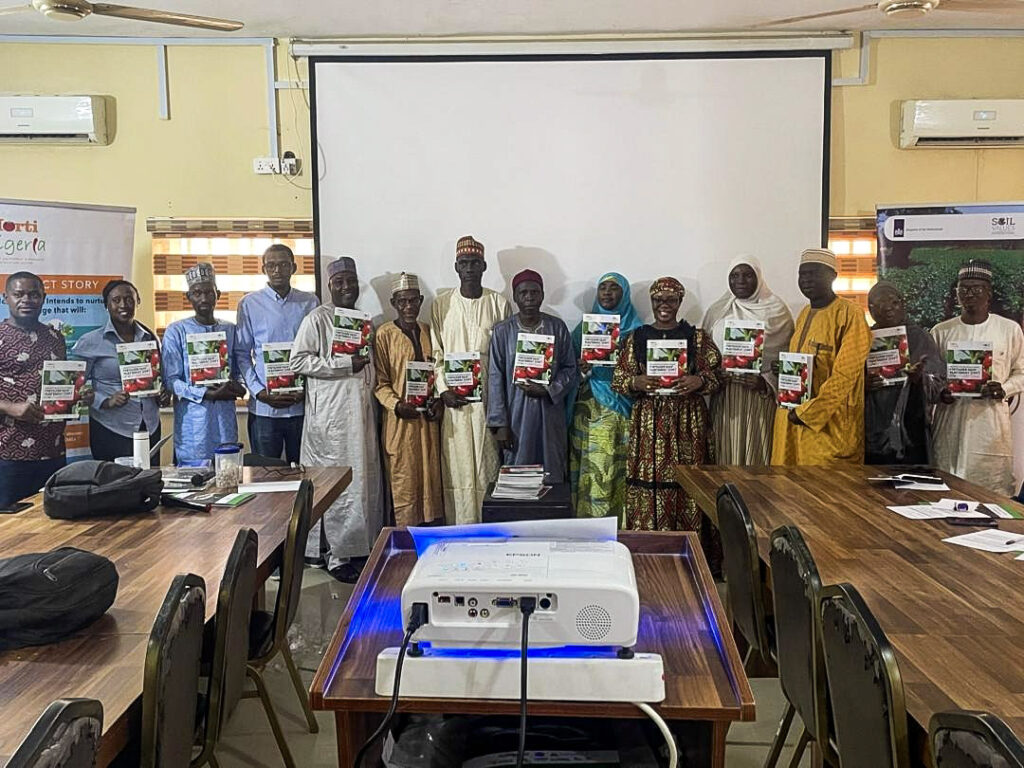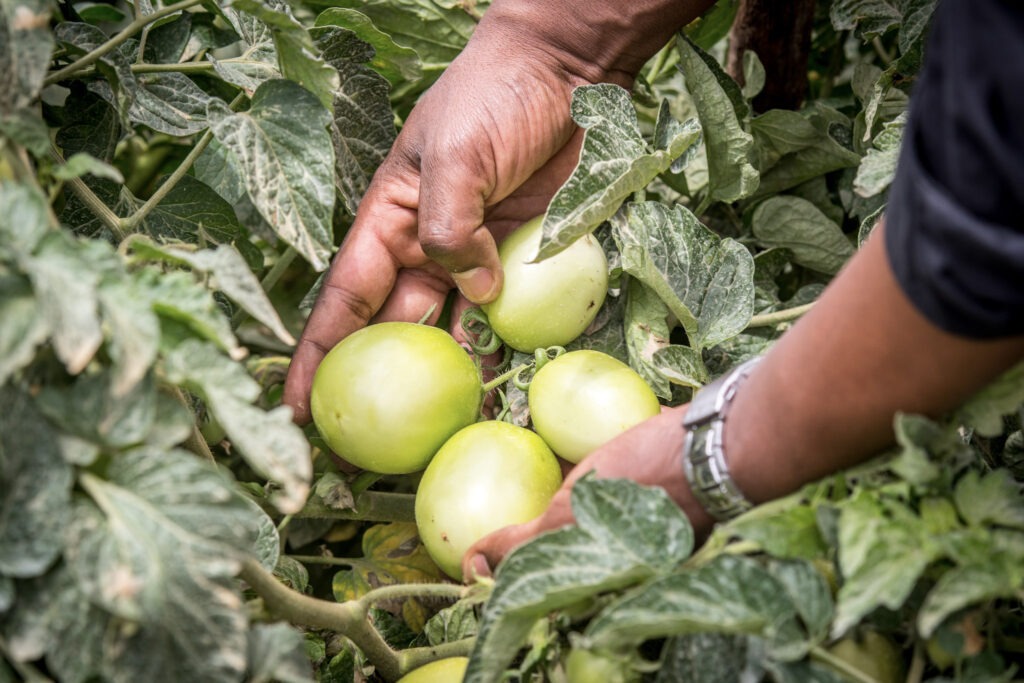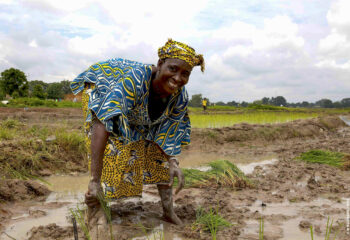
The Soil Values program, funded by the Netherlands Directorate-General for International Cooperation (DGIS), and the HortiNigeria program, funded by the Embassy of the Kingdom of the Netherlands (EKN) in Nigeria, co-organized a training event on the application protocol of fertilizer deep placement (FDP) technology in tomato production.
Held in December 2024 in Kano, Nigeria, this training initiative brought together 46 agricultural partners, including 10 women, to enhance participants’ FDP skills and establish demonstration plots managed by lead farmers under the supervision of extension agents. The training additionally facilitated a method of data collection for the development of a comprehensive FDP manual for vegetable production.
The joint training by Soil Values and HortiNigeria brought practical knowledge of this beneficial technology to tomato farmers in Nigeria, who will validate and share it even further through their demonstration plots.
Medinah Ayuba Fagbemi, the Soil Values Country Coordinator in Nigeria, emphasized that, through synergies with other projects and programs and support from partners in the agriculture sector, Soil Values aims to improve soil fertility and productivity across 800,000 hectares in Nigeria, with concrete actions already underway.
Abdullahi Umar, HortiNigeria Lead on Sector Coordination and Business-to-Business Linkages, explained that HortiNigeria aims to facilitate the development of a sustainable and inclusive horticulture sector that contributes to food and nutrition security in the country.
In Sahelian regions such as Kano, where weather disruptions severely impact agriculture, FDP technology offers a crucial solution to improve the productivity of vegetables and cereals. The extension agents and farmers who participated in this training learned the correct use of FDP and how useful it is for agricultural production, specifically for tomatoes.

FDP is not a new type of fertilizer but rather a technology that optimizes fertilizer use; it is an innovative and advanced fertilizer application method that involves placing nutrient-rich fertilizer briquettes beneath the soil surface, either manually or using an applicator, to enhance yields.
In addition to promoting optimal vegetative growth, FDP offers several other benefits, such as improved nutrient use efficiency, reduced weed competition (since fertilizer is applied below the weed root zone), and reduced nutrient losses caused by weathering. Furthermore, this effective solution allows for sustainable soil fertility management in farming for future generations through its reduced risk of nutrient leaching and its slow-release quality for prolonged nutrient availability.
The joint training covered key aspects of FDP application in tomato farming, including nursery management, transplanting techniques, and fertilizer methods, and it outlined FDP’s challenges.
For example, training participants learned that tomato plants should be transplanted 14 days after nursery establishment and that optimal spacing will differ slightly between ridges and beds. Only strong seedlings should be selected, and transplanting should take place early in the morning or late afternoon to reduce stress. The trainers strongly encouraged mulching to retain moisture and control weeds.
Fertilizers used for tomatoes include granular NPK and NPK briquettes, both of which can be applied basally in tomato production. Despite general recommendations for the amount of each nutrient, soil tests are necessary to adjust doses of N, P, and K.

Trainers stressed, however, that the two forms of NPK should not be applied at the same time: granular NPK should be incorporated into the soil before transplanting, while NPK briquettes specifically used for FDP should be placed at a specific depth and distance from the plant after transplanting. Three weeks later, urea supergranules (USG) should be applied at the same depth and distance.
Despite its benefits, FDP presents several challenges: manual application of briquettes can be time-consuming, water availability status can hinder maintenance efforts on irrigation infrastructure, and briquette supply remains limited. These factors need to be considered to ensure effective adoption of the technology in tomato production.
Following the training, participants were expected to assess FDP technology by establishing demonstration plots based on specific criteria, including seed selection, farmer participation, site selection, and role distribution among participants. Trainers prepared participants for this step by explaining the importance of observing FDP’s effects and collecting accurate data, as well as encouraging regular monitoring by extension agents as a crucial step in this objective.
These trials, which will be launched soon, will serve as an experimental framework to evaluate FDP’s effectiveness in tomato production, validate FDP technology, and produce the first formal training manual on FDP, making evidence-based recommendations available for farmers and supporting sustainable agricultural productivity.
According to Royal Blue Contractors Nigeria Limited, a leading agro-input producer and distributor, FDP has the potential to decrease production costs for farmers, create business opportunities, contribute to climate resilience by reducing carbon emissions.
The joint training by Soil Values and HortiNigeria brought practical knowledge of this beneficial technology to tomato farmers in Nigeria, who will validate and share it even further through their demonstration plots.
By equipping participants with hands-on knowledge, the initiative is set to generate local evidence, guide best practices, and support farmers with proven technology that can boost yields and strengthen sustainable agriculture in Nigeria.
About Soil Values
Funded by the Dutch Directorate-General for International Cooperation (DGIS), the Soil Values program is being implemented over 10 years (2024-2033), led by the International Fertilizer Development Center (IFDC), in consortium with SNV and Wageningen University and Research (WUR), as well as knowledge partners such as AGRA, the Center for International Forestry Research and World Agroforestry (CIFOR-ICRAF), the International Institute of Tropical Agriculture (IITA), ISRIC – World Soil Information, and the International Water Management Institute (IWMI).
About HortiNigeria
The HortiNigeria program (2021-2025), funded by the Embassy of the Kingdom of the Netherlands in Nigeria, aims to facilitate the development of a sustainable and inclusive horticulture sector that contributes to food and nutrition security in Nigeria. HortiNigeria is led by IFDC and implemented together with KIT Institute, Wageningen University and Research, and East-West Seed Knowledge Transfer Foundation.




